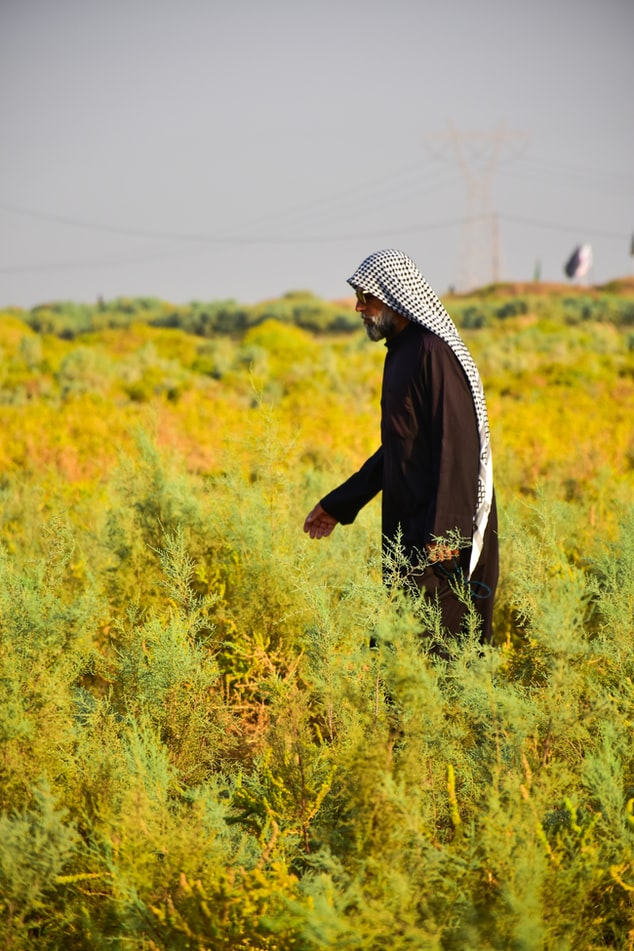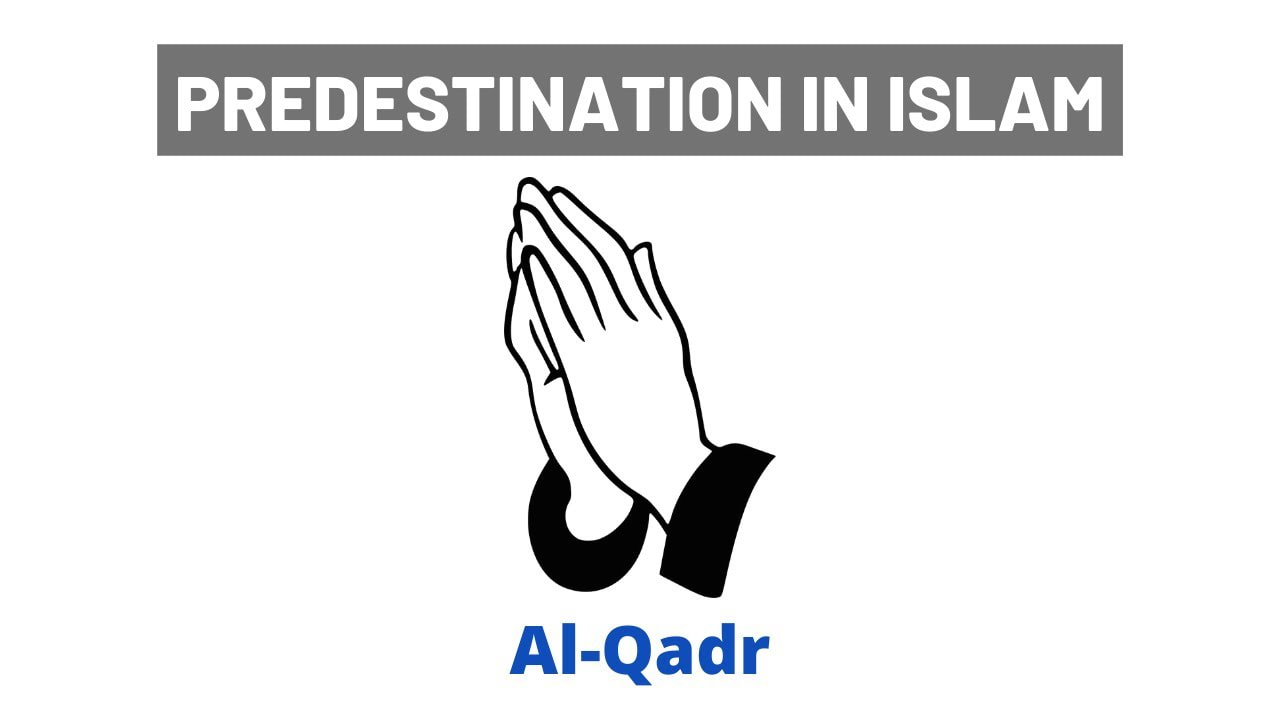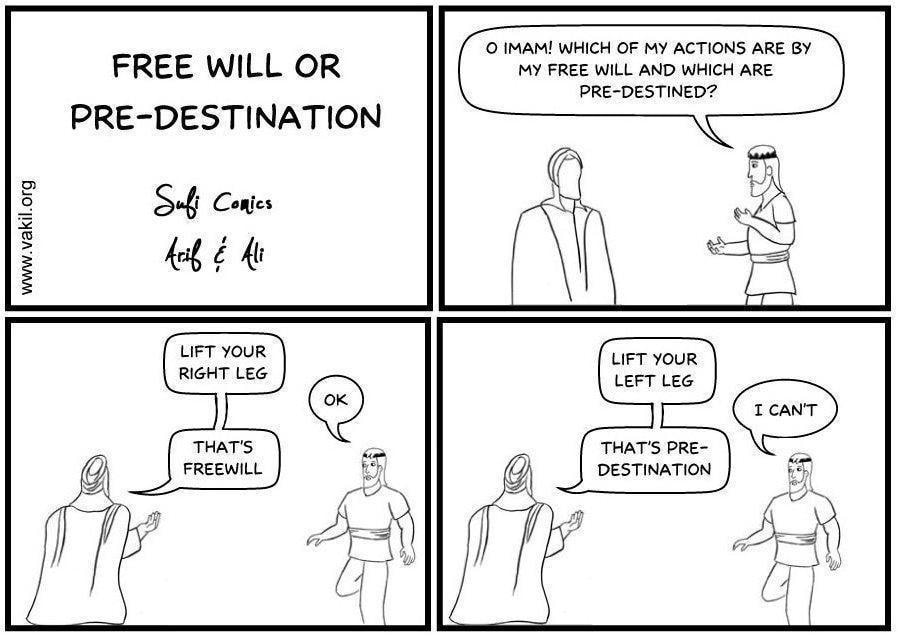 A brief description Allah ﷻ created us from a single drop and gifted us with intellect which makes us superior to all other creation on earth. It is this intellect that provides us the ability to exercise our free-will. In addition to intellect, Allah ﷻ sent revelation to us through His Prophets that guides us in exercising our free-will and live according to our choices. The choices we make in this life, between right or wrong and good or evil would have consequences in our lives in hereafter. Allah ﷻ has said all of this in the Quran: “Verily, it is We who have created man out of a drop of sperm intermingled, so that We might try him [in his later life]: and therefore We made him a being endowed with hearing and sight. Verily, We have shown him the way: [and it rests with him to prove himself] either grateful or ungrateful.”[1] After gifting us with intellect that assists us to use our reason and exercise free will, we are given the choice to either accept or reject the divine guidance given through revelation, and this God given liberty has also been mentioned in the Quran: “The truth [has now come] from your Sustainer: let, then, him who wills, believe in it, and let him who wills, reject it.”[2] Thus by making use of our free-will in accepting or rejecting guidance, both choices have their consequences in the hereafter and this is free-will according to Islam, in a nutshell. References: [1]Al Quran 76:2-3 – Asad Translation. [2]Al Quran 18:29 – Asad Translation.
0 Comments
 Influence of our actions on predestination One of the Prophet’s companions posed a question: “O Allah's Messenger! Shall we depend upon what is written for us and give up doing (good) deeds? For whoever among us is destined to be fortunate (in the Hereafter), will join the fortunate peoples and whoever among us is destined to be miserable will do such deeds as are characteristic of the people who are destined to misery.” The Prophet ﷺ replied, “Those who are destined to be happy (in the Hereafter) will find it easy and pleasant to do the deeds characteristic of those destined to happiness, while those who are to be among the miserable (in the Hereafter), will find it easy to do the deeds characteristic of those destined to misery.”[1] Then the Prophet ﷺ recited the following verse of the Quran to help explain better: “As for him who gives (to others), keeps his duty to Allah, and believes in the Best reward from Allah, We will make smooth for him the path of ease. But he who is a greedy miser and thinks himself self-sufficient, and gives the lie to the Best reward from Allah we will make smooth for him the path for evil.”[2] When Allah ﷻ says that He ‘will make smooth for him the path of ease or evil’ is because He observes everything that we say or do, in fact He is aware of each and everything our deep conscious inside of us whispers every second of our lives, “He is aware of the [most] stealthy glance, and of all that the hearts would conceal.”[3] Therefore, there is no way to escape His knowledge of our intention and free will and depending on how we make use of them, He writes our destination, as “with Him is the Mother of the Book.”[4] References: [1] Sahih Bukhari Vol. 6, Book 60, Hadith 473 [2] Al Quran 92:5-10 [3] Al Quran 40:19 – Asad Translation. [4] Al Quran 13:39 – This is the book of all divine decrees which carries decisions of Allah ﷻ pertaining to all creation.  Pre-eternal knowledge of Allah ﷻ and His Divine Will are two separate matters According to Islam, Allah’s pre-eternal knowledge of His creation does not mean His predestination of their acts. Allah ﷻ is Al Aleem (All Knowing and Most Knowledgeable) and He carries the knowledge of future of all His creation including humans. However, His pre-eternal knowledge of all humans and their destiny in this life and the hereafter, does not mean He predestines all actions for them. In other words pre-destination is not enforced upon any human as that would deprive us from exercising our God given free will and defeat the purpose of our existence. His pre-eternal knowledge of our acts and the influence of His divine will on our destiny are two separate matters. He observes our intentions and actions and then writes our destiny accordingly: "Allah erases whatever He will and He fixes whatever He will, and with Him is the Mother of the Book (Ummul Kitab)."[1] This ‘ ‘Erasing’ and ‘Fixing’ in the ‘Mother of the Book' is His decisions for His entire creation and for beings like ourselves who have been given free will. Our destinies are written in accordance to our intentions and actions which are conducted based on our free will. This verse clearly states that everything is ultimately in the hands of Allah ﷻ and if He wills He can change it for whomsoever He wills but He observes whether the person uses their free will to accept His guidance and obeys or rejects it and disobeys. It is in the light of this understanding that Allah ﷻ says: “As for him who gives (to others), keeps his duty to Allah, and believes in the Best reward from Allah, We will make smooth for him the path of ease. But he who is a greedy miser and thinks himself self-sufficient, and gives the lie to the Best reward from Allah we will make smooth for him the path for evil.”[2] Whatever is decreed in the mother of the book (ummul kitab) will determine and make smooth for us the path of ease or path of evil as: "... Allah has full knowledge of everything."[3] References: [1] Al Quran 13:39 [2] Al Quran 92:5-10 [3] Al Quran 24:35  In order to answer this question we need to first make it clear what is free will in Islam. Some people mistakenly think, especially my experience with atheists, that in Islam when Muslims say ‘Allah has given us free will’ then it means that it is pure free will with no interference of Allah ﷻ whatsoever. According to their understanding, if there is interference of Allah ﷻ then that could not be free will. In Islam, we say that free will is 50% or half and there is no such thing as pure free will. The reason for that is because Allah ﷻ does intervene when and if necessary and that is His Mercy that He has not completely abandoned us to ourselves by giving us pure free will. To understand this concept better we have a visual illustration of an incident from the life of Imam Ali ibn abi talib (alaihi salaam). Someone asked him “O Imam which of my actions are free will and which are predestined?" To which Imam replied, “Lift your right leg” the man did it and then he was told “that is free will”. Then the Imam said to “lift the other as well.” which obviously the man could not. To which Imam replied, “That is your predestination.” Imam Ali (a.s) explained the extent of our free will in Islam and then what happens next is by the will of Allah. Our Islamic belief of rewards and punishments are not just based on free will or what some might call ‘pure free will’. According to a prophetic hadith: “Actions are based on intentions and you will be judged for your intention.”[1] My intention will make me do a certain action and that is all I have to worry. We care about intention and our ability to do the required actions; outcomes are in the hands of Allah ﷻ, we are not supposed to stress ourselves over what the future holds for us as long as we did the right thing and placed our trust in Him. That is what is called having imaan (faith) and tawaqqul (trust) in Allah ﷻ. The ultimate result of our action will always be good, either in this world or in the hereafter, even though the apparent results came out wrong, as long as our intention was pure and good, He will take care of us as He has said: “But perhaps you hate a thing and it is good for you; and perhaps you love a thing and it is bad for you. And Allah Knows, while you know not.”[2] References: [1] Sahih al-Bukhari 1 [2] Al Quran 2:216  A prayer Muslims usually say ‘insha’Allah’ (Arabic إنشاءالله) which means “Allah willing” or "if Allah wills" before planning to do something. It is because Allah ﷻ has taught us these words in the Quran: “And never say of anything, ‘Indeed, I will do such and such tomorrow,’ Except [when adding], ‘If Allah wills.’”[1] This is a prayer for us and does not in any way contradict our ability to exercise free will. What this expression implies that we will try our best but the ultimate result is in the hands of Allah ﷻ whether it would produce the intended result or no. That is what "insha’Allah" means. This is a mindset of humility that we adopt before planning to do an action because as mentioned in the prior posts that Muslims should not overly concern themselves with results as long as the intention was pure as that is what we will be judged upon: "Actions are to be judged only by intentions and a man will have only what he intended..."[2] The word "insha'Allah" is an expression to remind us that even though we will use our free will and do the action yet it is only Allah ﷻ who really decides for us what is better in terms of results, and we put our trust in Him: "But you cannot will (for results to happen) it unless Allah wills, for, behold, Allah is indeed All-Seeing, Wise."[3] References: [1] Al Quran 18:23-24 [2] Sunan Abu Dawud Book 12, Hadith 2195 [3] Al Quran 76:30 - Asad Translation How to conform our wishes to Allah's will
The simple answer is that first we have to know what is Allah’s will. This can obviously be learned by reading the Quran and the teachings of Prophet Muhammad ﷺ. As we learn them we will begin to realize if a thought occurs to us from within our own selves is in conformance to the will of Allah ﷻ or in opposition to it. However, there is also a catch! Every wish of our that agrees to what we generally accept, as Allah’s will (His teachings) does not mean that it is truly His Will at that moment. This fact can be better understood from an account of one of the earliest saints in Islam named Owais Al Qarni (radiAllahu anhu). Owais (r.a) was living in Yemen with his mother who was very old as well as blind. She had no one to take care of her except Owais (r.a). He was very pious and heard about a man name Muhammad ﷺ in Yathrib (old name of Madinah), who claimed to be a Prophet of Allah ﷻ and was preaching the message of Islam. This appealed to him a lot and he desired and wished to join him in his struggle and become one of his companions. He asked permission from His mother who refused for him to leave her but allowed him to go to Yathrib (where Prophet was at that time) meet him in person and come back without any delays. After promising his mother, he reached the town only to find out that the Prophet ﷺ was away from home. As per promise he immediately left the town and went back to Yemen. The Prophet ﷺ after returning sensed that this honored person had come by. He prayed abundant blessings for him and told his companions how great this man is for serving his mother and that they should honor him when he returns after his death. After the Prophet passed away, Owais (r.a) came to Madinah and was honored by the Prophet’s companions. Despite the fact that he never met the Prophet ﷻ yet his honor was greater in the sight of Allah ﷻ than those who became the Prophet’s companions. The moral of this story is that what could be better virtue than joining a final Messenger of Allah ﷻ sent for humankind, be part of his struggles and help the religion of Allah ﷻ. However, what was apparent virtue was not a real virtue. Indeed Allah’s will was in Owais (r.a) staying with his mother and taking care of her rather than joining the Prophet ﷺ and his companions, even though Quran apparently showers abundant praises on those who help Allah ﷻ and His Messenger ﷺ. The Prophet’s prayers and honor for him was a confirmation of this man’s blessed choice! Virtues are virtues for all times as taught to us by Allah ﷻ, but what is the real virtue to follow at the very moment is what will determine if your wish is in accordance to the will of Allah ﷻ or no and that is the meaning of His words: “As it is, man [often] prays (and wishes) for things that are bad as if he were praying for something that is good: for man is prone to be hasty [in his judgments].”[1] The hastiness that Allah ﷻ speaks about is part of the weaknesses in human nature that He created us with. Therefore, one has to be careful, as there is a very thin line sometimes between Allah’s Will and our wishes. Our desires may overlook His actual will for the moment, due to it not agreeing to our wishes. This is where usually the very religious people (and even non-practicing ones) stumble when following religious commandments. Another good example is an incident from life of Isa ibn Maryam (Jesus son of Maryam) (alaihi salaam). One day satan came to Isa (a.s) and ordered him to utter “la ilaha ill-Allah (there is no god but Allah)”. To which Isa (a.s) replied, “No doubt what you said is the truth but why should I do as you want me to?”[2] This is an internal distinction that Allah ﷻ blesses the believers with to distinguish between true thoughts versus false ones, as long as we maintain being conscious of Him in all situations. The Quran reminds the believers to be wary of such a mindset that follows wishes while thinking they are doing everything in accordance to Allah’s will: “Say: ‘Shall We tell you the greatest losers in respect of (their) deeds. Those whose efforts have been wasted in this life while they thought that they were acquiring good by their deeds.’”[3] They thought their actions were according to Quran while actually they were following their desires. Taqwa[4] (consciousness) assists believers in determining whether their wishes are truly in accordance to the will of Allah ﷻ or no, because wishes emerge from our desires which are part of nafs (evil inclinations of soul). It is due to this that Prophet Muhammad ﷺ after returning from the battle said to his companions: “You have returned from jihad asghar (the minor struggle) to the jihad akbar (the major struggle)”[5], calling the act of opposing the nafs as a major jihad (struggle). Thus our wishes should always be guided by reason, revelation and our decision should be based on consciousness of Allah ﷻ, then by His will, our faith will not falter in determining if our wishes are in accordance to Allah’s will or no. References: [1] Al Quran 17:11 – Asad Translation [2] Recorded in Ihya Ulum id Deen of Imam Ghazzali. [3] Al Quran 18:103-104 - Asad Translation. [4] Consciousness and awareness of the fact that Allah ﷻ is watching one and is present at all times. [5] Al-Bayhaqi - al-Zuhd al-Kabir. |
AuthorZaid Shaw ArchivesCategories |
Proudly powered by Weebly
 RSS Feed
RSS Feed